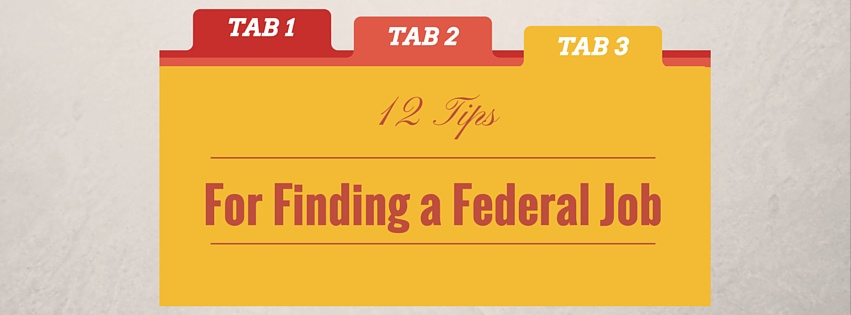Applying to a federal job is far different than applying to your run-of-the-mill private sector position. You will be asked for far greater detail on your skills, abilities, and experience. You’ll likely endure a lengthy wait time after applying to hear if you’re being considered. And when you get started on your search, it might be difficult to even figure out where you fit. So, to bring a bit more clarity to the process, here are 12 tips to help you navigate the federal job application process:
- Know what you’re looking for before you start. The federal government is vast and there are positions for pretty much every interest or ability, so it’s important to familiarize yourself with the landscape, figure out where your interests, skills, or education fit, and determine what is most important to you in a job. Once you have it narrowed down, look into the agencies that seem interesting to you. Figure out what the mission is, and decide whether you would be a good fit and if you have something to offer. USAJobs has a helpful tool that breaks down federal occupations by college major.
- Don’t rely strictly on USAJobs. There are other websites that host federal postings, including agency websites themselves.
- Determine whether you’re actually qualified. When you find a job (or a handful of jobs) that you want to apply for, carefully read the posting to determine if you are actually qualified to apply. Be sure that you are within the appropriate grade, have the right skills and qualifications, and make sure the job is open to you (i.e. if you are not currently a fed, you can only apply to those jobs open to all citizens).
- Follow all of the application instructions. The vacancy announcements for federal jobs are lengthy and involve a lot of directions. Be sure to include all of the required forms, answer all of the questions, and include any supplemental information or certificates asked for.
- Decide on a resume format. Federal applications are lengthier than the one- or two-page resume, sometimes running four to five pages or more. Most agencies accept traditional resumes, CVs, or the Optional Application for Federal Employment. The latter is a form that includes all of the information you are required to submit in your standard application (take note, however, that the job posting might require some additional supplemental information). If you choose a resume or CV, be sure to include everything requested in the posting.
- Directly address qualifications. Given how lengthy resumes can be, and how many are received for each position, make it easier for yourself to rise to the top by speaking directly to how your past experience, skills, or education fit exactly what the position is looking for. And don’t feel like you can only rely on on-the-job skills and experience. If it’s relevant, include experience that you gained volunteering.
- Keep it simple. Provide all of the information requested in the posting, but be direct in your responses. Briefly explain what you’ve done in your past positions, without exaggerating or using overly flowery language. Be sure to include keywords from the posting in your descriptions. Don’t cram as much information as you can onto each page—make your application visually easy to read.
- Update your resume. As you apply to various jobs, be sure to give your resume all of the updates required based on the job posting. Don’t assume that the qualifications for similar positions will be the same. It will hurt your chances in the process.
- Keep a handy Word or text file of your resume. If you end up filling out an online only application, it is far easier to copy and paste than to retype all of your information.
- Network! As you’re going through the application process, don’t forget to network. Make as many contacts as you can—you never know who might be able to help you get a leg up for the job you’re looking for. And don’t ignore your network once you get hired—you never know who will be able to help you move up.
- Consider an internship. If you’re struggling to get your foot in the door, and you can afford it, take an unpaid (or low paying) internship to gain some of the skills and experience to help you stand out in the resume pool. And it will give you a great chance to make connections.
- Be patient. The feds are notoriously slow to hire. Don’t get discouraged if you don’t immediately receive a response to your resume, or even if you don’t hear anything. Keep applying to what interests you, being sure to update your resume along the way as appropriate.
Learn more about this topic by checking out these resources:
GovLoop’s Unofficial Guide to Getting a Federal Job
Guide to Getting Into Government
What tips would you add to the list?





Kudos, Heather!
You might want to think about developing a “SHARE” button option.
Hi RoseAnn, the share buttons are on the top of this post, near the headline. Hope you’ll share this post!